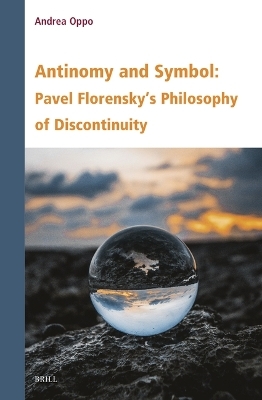
Antinomy and Symbol: Pavel Florensky’s Philosophy of Discontinuity
Brill (Verlag)
978-90-04-70875-4 (ISBN)
Pavel Florensky (1882–1937) was a Russian philosopher, theologian, and scientist. He was considered by his contemporaries to be a polymath on a par with Pascal or Da Vinci. This book is the first comprehensive study in the English language to examine Florensky's entire philosophical oeuvre in its key metaphysical concepts. For Florensky, antinomy and symbol are the two faces of a single issue—the universal truth of discontinuity. This truth is a general law that represents, better than any other, the innermost structure of the universe. With its original perspective, Florensky’s philosophy is unique in the context of modern Russian thought, but also in the history of philosophy per se.
Andrea Oppo, Ph.D. (1970), is Professor of Philosophy at the Pontifical Theological University of Sardinia. He is the author of several works, including Shapes of Apocalypse: Arts and Philosophy in Slavic Thought (ed.) (2013) and Lev Shestov: The Philosophy and Works of a Tragic Thinker (2020).
Contents
Preface
Acknowledgements
Introduction
1 What Is Florensky’s Philosophy?
2 Conceptualizing Discontinuity: A Perfect Oxymoron
3 Continuity: The Mainstay of the Western Scientific View
4 Florensky’s Discontinuity: Antinomy and Symbol
1 Searching for Discontinuity: Florensky’s Pythagorean Mathematics
1 The Moscow School of the Theory of Functions
2 Between Function and Form: Florensky’s “Speculative Mathematics”
3 Back to Pythagoras: Toward a “Mathematics Outside Mathematics”
2 Truth as Self-Contradiction: Platonic Influences and Philosophy of Knowledge
1 From Mathematics to Theology: Florensky’s “Magic” Plato
2 Plato’s “Idealism,” or the Antinomic Nature of Reason
3 The Quest for “Praeambula Rationis”: The Fundamental Antinomy of Knowledge
3 The World of Antinomies: Between Theology and Logic
1 Discovering the Kantian Antinomies
2 “Tertium Datur”: The Way of Theological Reason
3 The Ground of the Paradox: The Logic of Florensky’s Antinomies
4 Plato and Kant in Florensky’s Philosophy of History
1 The Philosophical Foundation of History
2 Plato vs. Kant: Resetting History
3 The Middle Ages and the Renaissance as Categories of Thought
4 Plato, Kant, and the Discontinuous Sense of the World
5 Concrete Metaphysics and the Philosophy of Nature
1 Ways and Centers: The Concretization of Metaphysics
2 From Antinomy to Symbol: The Boundary as a Philosophical Problem
3 Symbolarium: True Knowledge as Form
6 Nature, Art, and Perspective: Pavel Florensky’s Aesthetic “Realism”
1 Art in Reverse: A Theory of Multiple Spaces and Times
2 The Symbolic Paradigm of Knowledge and True Realism
3 The Role of the Symbol: Examples from Arts and Literature
4 Conclusion: Art as a “Living Organism”
7 The Philosophy of Discontinuity as a Philosophy of the Name
1 Language, Word, and Identity: Florensky’s Philosophy of Literature
2 The Original Power of the Word
3 The Palamitic Logic and Onomatodoxy
Conclusion: Toward a “Scientific Neoplatonism”
Bibliography
Index
| Erscheinungsdatum | 30.08.2024 |
|---|---|
| Reihe/Serie | Contemporary Russian Philosophy ; 6 |
| Verlagsort | Leiden |
| Sprache | englisch |
| Maße | 155 x 235 mm |
| Gewicht | 505 g |
| Themenwelt | Geisteswissenschaften ► Philosophie ► Erkenntnistheorie / Wissenschaftstheorie |
| Geisteswissenschaften ► Religion / Theologie | |
| ISBN-10 | 90-04-70875-8 / 9004708758 |
| ISBN-13 | 978-90-04-70875-4 / 9789004708754 |
| Zustand | Neuware |
| Haben Sie eine Frage zum Produkt? |
aus dem Bereich


![Was heißt Denken?. Vorlesung Wintersemester 1951/52. [Was bedeutet das alles?] - Martin Heidegger](/media/113619842)